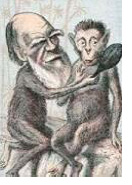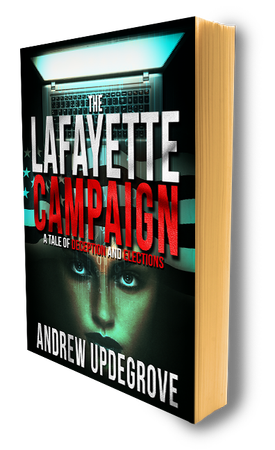Last Monday I reposted an entry with a Darwinian theme from the beginnining of the last U.S. presidential campaign. Here's one from the end.
 Praises be, it's over — over and done with — finis — no longer plaguing us and finished. I refer, of course, to that quadrennial paroxysm of democratic hysteria we prosaically call a "Presidential Election." Thank God.
Praises be, it's over — over and done with — finis — no longer plaguing us and finished. I refer, of course, to that quadrennial paroxysm of democratic hysteria we prosaically call a "Presidential Election." Thank God.
Along the way, we heard enough lies, damn lies and Super PAC ads to last us for the rest of our lives, and then some. And early in the process, it seemed like we were living in the middle of the next installment of Men in Black, except that none of the primary candidates went back to their home planets after they were defeated.
At the heart of all this nonsense, though, there is a central reality that never ceases to amaze me: how is it that so many Americans can disagree so fundamentally with each other about so much, each convinced that he or she is possessed of the equivalent of divinely revealed truth while those on The Other Side are possessed by the Devil, or worse?
This divergence of opinion is not simply random, of course. If you boil down all of the points of disagreement, one philosophical difference always seems to emerge. Not the only difference, perhaps, but one that seems to underpin and resonate with any other tenet you may discern amid all of the heated rhetoric and dubious justifications.
That difference boils down to this: do we think that a safe, secure and prosperous future can only be ours if we give the individual the greatest freedom of action with the fewest economic burdens, or do we believe that such a result can only be obtained if we empower the government to look out for all members of society, and accept the costs and impositions on individual action that will necessarily follow from such policies?
Depending on which of these perspectives you may hold, the answers to all of the great questions of the day become not only obvious, but diametrically opposed to those who see the world through the other set of glasses. And never the twain shall meet.
Those that see the world from one of these perspectives with particular conviction sometimes find that it becomes impossible to understand the other side’s point of view at all. The result is that the prospect of compromise ceases to be a question of pragmatism, and rises to the level of an unacceptable betrayal of principle.
There does not seem to be any innate logic in who ends up holding which view. Conservatives and liberals can spring from the same parents; can have the same IQs and life experiences; and can grow up in the same communities. And yet each believes passionately in the rectitude of his own world view.
How can such a situation have come about?
I’ve mulled this over for quite some time, and have concluded that the answer is far simpler than one might assume. Not only simple, but almost unquestionably accurate. But before I proceed to share it, I should warn any Creationists that may have wandered onto this mailing list to read no farther, because in the next sentence I am going to use a word that will upset you.
That word, of course, is evolution. Among all of the theories that I have encountered in my lifetime, the theory of evolution is the most elegant, the most powerful, the most astonishingly versatile, and the most invariably generous in providing a compelling answer, regardless of the question. Unlike abstruse concepts such as relativity and quantum physics, evolution is as easy to apply as it is to understand. Notice something in the living world and wonder how it got to be that way, and you can invariably come up with an evolutionary explanation, usually without even breaking a mental sweat.
And so it is with the existence not only of conservatism and liberalism, but also of the continuing coexistence of each. Let’s see why this is, and indeed must, be so by looking at the evolutionary advantages that each perspective can bestow on those programmed to manifest it.
Let’s start with conservatism. Imagine that you are a hunter-gatherer, or, in later ages, a farmer. Only by surviving long enough to see your progeny become self-reliant will your genes continue to exist. Keeping all you kill, gather or reap for your family will ensure that those that share your genes will be most likely to survive.
Anything that impedes your ability to feed your family, such as sharing with others, or staying to defend others rather than fleeing with your family, will raise the chance that your individual genetic line will go extinct. Consequently, any genes that might predispose you in that direction would be likely to be flushed from the gene pool, and any that might motivate you to look out for your family would be sustained.
But this does not describe every human being. Instead, we also exhibit something that evolutionary geneticists originally puzzled over: the concept of ‘altruism,’ meaning (in this context) the taking of actions that are for the benefit of family members, and which might even jeopardize the actor’s own survival. But even if the actor does not survive, by reason of his sacrifice his genes might live on through his progeny. Indeed, given the degree of interbreeding within a band, acts of self-sacrifice on behalf of non-immediate family members could still favor the preservation of the commonly held genes that led to such behavior.
Modern evolutionary explains less dramatic acts of altruism by noting that the survival of the individual may also rely on the survival of the band. An individual can be injured, or become ill, or have no luck in the hunt. In each case, the individual and his family must rely on the altruism of other members of their band to feed and protect them in their hour of need. Even the survival of individuals that are past reproductive age can be important because those individuals (e.g., grandmothers) can help raise children — a particularly important role during hunter-gatherer times, when a child that could not yet walk, or was temporarily sick or injured, had to be carried.
Once the evolutionary importance of altruism became accepted, it became clear that the survival of genes that might predispose an individual to share and protect the band could be favored, while those that might lean in the opposite direction could be more likely to reach a dead end, depending on the circumstances.
What we have just described should be starting to sound like what lies at the heart of the divergent viewpoints of conservatives and liberals. The conservative believes that it is his right to look out for himself and his family, that his ability to do so should not be impaired by impositions that he has not agreed to, and that he should not be required to share the monetary fruits of his labors, since that may impair his ability to fend for himself and his family. And the liberal is willing to share with others (through taxation) and accept more constraints on his freedom of action (in the form of laws and regulations) because he believes that he will be better off if everyone is better off.
Sounds pretty neat, doesn’t it? But if it’s that easy to explain, why do we have both conservatives and liberals rather than conservatives or liberals? Wouldn’t one behavioral strategy or the other have proven to be superior over the millennia, ultimately driving the other out of existence?
Well, no, and that’s where evolutionary theory once more provides an answer. Briefly stated, evolution tends to hedge its bets, because the world we live in is dynamic in so many ways.
Consider the example of a long period of abundance, during which either hunter-gatherers or farmers are able to rely on a steady food supply. During such a period, life is easy, and everyone can look out for themselves with little assistance from other members of the band or the village. There is no advantage to sharing, but keeping as much as possible for yourself can allow you to work less, or have higher status. The more successful you are at feeding and caring for your family, the more of your progeny will be likely to survive. And if you are attacked and flee rather than fight and die, your genes will have a chance to carry on.
But now the weather changes, and there isn’t enough to go around. The hunter-gatherers need to rely on the kindred bands they intermarry with, some of whom are far enough away that their food supply is less affected. And farmers that are part of societies that have laid stores of grain aside for the benefit of the community will survive to plant their withered crops again.
The point is that one strategy may be more successful in one set of circumstances than the other, but each situation can be expected to arise with some degree of frequency over time. Thus, the prevalence of the gene sets that lean to each perspective can be expected to rise and fall in the near term, but prevail over the millennia, thus ensuring that the species as a whole survives absent some consummate disaster that moots all in-bred behavioral strategies.
To round out our theory, we can presume that we are not talking about a single, dominant Mendelian gene that can flip one way or another, but a series of genes that interplay with each other, resulting in differing degrees of manifestation, as is the case with autism and many other genetic conditions. And thus we have both Tea Party and moderate conservatives, as well as left wing and centrist liberals, too.
I’m sure that I must be only one of many to have reached the same conclusions, so why is a genetic basis for political viewpoint not a default assumption? Presumably because no one likes to think of themselves as some sort of pre-programmed automaton (no matter how much they may act like one — particularly during an election year). Rather, we like to think of ourselves as free agents, endowed with free will and the ability to act as masters of our own destinies.
That’s too bad. Why? Because if we were to acknowledge that each of us believes what we believe for a reason, that what each of us believes has helped our direct ancestors to survive for over 100,000 years, and that our species would likely not have survived at all unless both viewpoints continued to exist, then perhaps compromise wouldn’t seem like such a bad idea after all.
I wish, although without much hope, that this theory would spread and become accepted. The reason is simple: it could help break the deadlock in Washington that has cursed us for the last four years. And from a more self-interested point of view, I’m not sure that my own genes can survive another election year like the last one.
Impossible candidates jump to the top of the polls…sound familiar?
Find out how it ends by reading:
The Lafayette Campaign, a Tale of Deception and Elections
Andrew Updegrove brings a rare combination of drama, satire and technical accuracy to his writing. The result is a book you can’t put down that tells you things you might wish you didn’t know.
Admiral James G. Stavridis, retired Commander, U.S. European Command and NATO Supreme Allied Commander Europe, and current Dean of the Fletcher School of Law and Diplomacy
